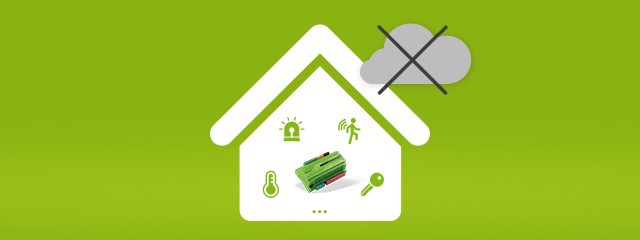
Does A Smart Home Need The Cloud?
A recent article on ZDNet brought up a good topic: the lifespan of tech nowadays. Look at your mobile phone, now look at me, now look at your mobile phone…how long have you had it? Most of us start feeling the need (it’s more a want, but that’s just semantics) for a new mobile after 18 months and most contract options have us taking home a new piece of tech every two years.
Apart from the massive e-waste problem that this is potentially causing, let’s pick up on a different point here: when does the lifespan of tech become too short?
Consider the IoT domain. A mesh of modern gadgetry supposed to make our lives easier. Granted some do, but what about when one of those gadgets that we become so reliant on fails us? Or even worse, when the entire service that keeps them running shuts down for good and a device that is still in perfect working order becomes useless? I’m talking about the cloud. A word that up until about 10 years ago, for most of us, meant the big white fluffy things in the sky.
THE CLOUD
The cloud has been around since the 1970’s, albeit in a very crude form, but arguably gained traction in the mainstream commercial sphere around 2008. In such a short space of time, tens of thousands of devices have capitalised on the infrastructure and technology of the cloud, which has played a major part in the birth of the Internet of Things, or IoT.
In such a short space of time however, and much to the dismay of many early adopters of technology, support for cloud-reliant IoT devices can be withdrawn.
Take for example Revolv’s smart home hub. It was announced a few months ago that the web service powering the £200+ device was to be shut down. One Revolv customer was particularly unhappy. He raised the question of whether moves like this would change the concept of ownership.
In 2014, Google bought Nest, a brand whose products have turned a lot of heads in the connected homes market. Later that year, Google bought the startup behind smart home hub Revolv, and just two months later made an announcement that it would be shutting it down, saying that their intention was to use the brains behind the operation to focus on Nest.
Tech writer and enthusiast, Alan Zeichick, has just penned a piece on Network World about another device that’s having its service shutdown. Being an avid user of NETGEAR’s VueZone cameras, Zeichick has received an email from them saying ‘NETGEAR, Inc. will be discontinuing the VueZone Services on December 31, 2017’. The silver lining here (cloud pun intended) is that NETGEAR users have 18 months to save up some cash to replace their arsenal of wireless video cameras. The downside; this could end up a never-ending cycle because whichever cloud based camera system becomes the new favourite, the lifespan of it will always be like a dark cloud (these puns are getting too easy now) hanging over it.
It is understandable that consumers are angry that devices they have spent their hard-earned cash on are being rendered useless. It doesn’t seem fair that corporate giants can leave their customers in the lurch like that.
So where is the line between us as consumers deciding on when something we have bought has come to the end of its lifespan in our eyes, even if it still functions, and when is it okay for a company to determine this for us?
THE SOLUTION
If buying into IoT devices might mean they won’t be supported or even work a few years later then how do you turn your home into a smart home and benefit from Autopilot Living? Well, you do have several options. There are ecosystem solutions (have you heard about Loxone?!) that don’t require cloud services to deliver home automation. This means the lifespan is no longer a worry and it means your data is safer too, since it doesn’t get stored in the cloud.
Yes, being connected to the Internet enhances the functionality of a Loxone Smart Home, like being able to retrieve weather data, send notifications, and allow you to do things remotely when you aren’t at home. The point here though is that you don’t need to be reliant on the cloud for home automation with the possibility of your smart home system becoming obsolete at any moment.
At Loxone, we are embracing that notion. For us, it’s about your home making your life easier by taking care of hundreds of daily tasks for you relating to your lighting, heating, security, music and more – and all of that is done without a cloud in sight.
